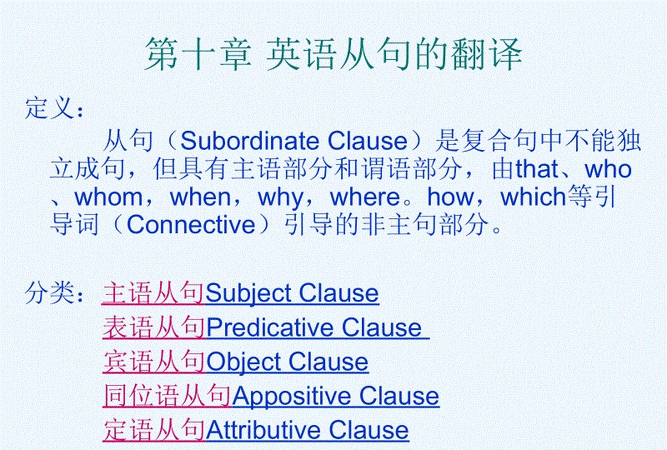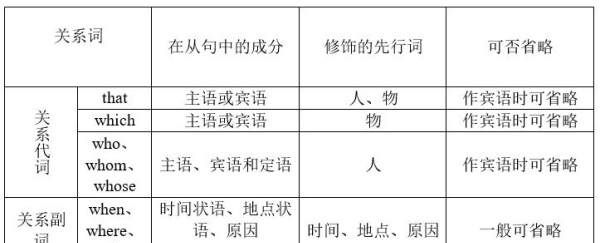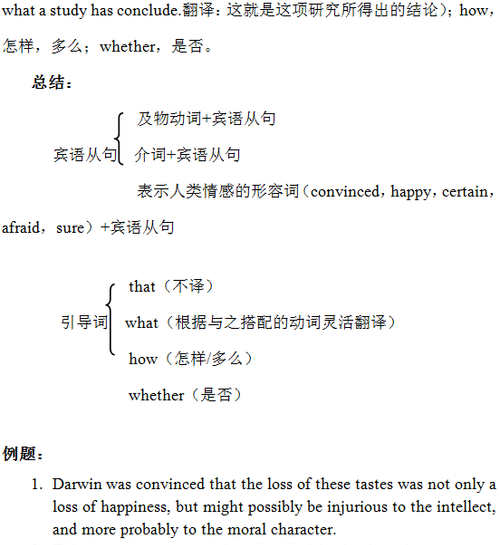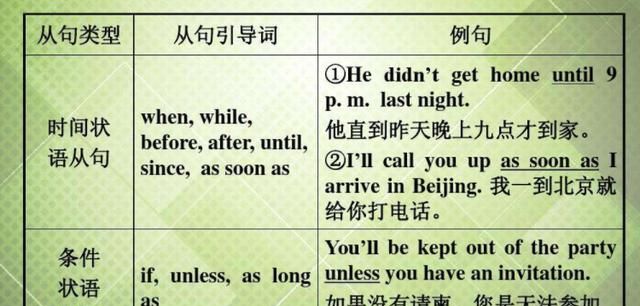本文目录
考研英语中状语从句怎么翻译成中文的
英语翻译的备考不能只停留在“看”的层面上,要扎扎实实的“做”翻译,提高动手、动笔的能力,那样才能切实的提高翻译水平,那么如何做呢? 在做的过程中应把握哪几步呢,这一定是众多考生迫切要知道的。建议大家,可以把考研阅读中的长难句拿出来翻译,提高一些动手能力。翻译题型自从作为考查考生综合运用语言能力的题型出现后,很多考生觉得难以动笔,认为这种题型的难度较大。而这种题型在近些年的考研英语试卷中出现以后,考察形式已经趋于稳定。考题要求考生在理解全句、全段或全文的基础上,把语法、词汇的意思和上下文结合起来理解。
考研英语中状语从句怎么翻译成中文
我为2016年的考生具体分析一下考研英语翻译的考查及解题技巧。
一、时间状语从句
在英语中,时间状语从句的连接词常常有:when(当.。.的时候),whenever(每当.。.),as(当.。.时), since(自从.。.),until(直到...,如果不..。.),till(直到.。.),before(在.。.前),after(在.。.后),as soon as(一.。.就),once(一旦.。.),the moment(一.。.就),immediately(一.。.就),the day(在.。.那天),no sooner... than(一.。.就),hardly(scarcely)... when(一.。.就),the instant(一.。.就),instantly(一.。.就),directly(一.。.就),the minute(一.。.就),the second(一.。.就),every time(每当.。.),by the time(等到..。.的时候)等。
(一)译成相应的时间状语
While she spoke, the tears were running down。
她说话时,泪水直流。
She came in when I was having supper。
我正在吃饭的时候,她进来了。
As he finished the speech, the audience burst into applause。
他结束讲话的时候,听众掌声雷动。
(二)译成“一(刚、每).。.就”的结构
I’ll let you know as soon as I have it arranged。
我一安排好就通知你。
Directly he uttered these words there was a dead silence。
他刚说出这些话,大家就沉默下来。
(三)译成条件句
Turn off the switch when anything goes wrong with the machine。
如果机器发生故障,就把电门关上。
A body at rest will not move till a force is exerted on it。
若无外力的作用,静止的物体不会移动。
We can't start the job until we have the approval from the authority concerned。
如果没有有关当局的批准,我们不能开始这项工作。
二、原因状语从句
英语中,原因状语从句的连接词常常是:because(因为),since(既然,由于),as(因为),now that(既然),seeing that(既然),considering that(考虑到,因为),in that(在某方面),in view of the fact that(鉴于)。
(一)译成表示“原因”的分句,放在主句之前翻译,显示“前因后果”的关系。
The crops failed because the season was dry。
因为气候干旱,作物歉收。
We had to put the meeting off, since so many people were absent。
由于很多人没有来,会议只好延期。
(二)有时候可以用汉语的“之所以.。.是因为”的结构来连接。
A gas differs from solid in that it has no definite shape。
气体不同于固体是因为(就在于)它没有固定的形状。
He will get promoted, for he has done good work。
他将得到提升,因为他工作干得好。
Theory is valuable because it can provide a direction for practice。
理论之所以有价值,是因为它能给实践指出方向。
(三)not...because的结构
I don’t teach because teaching is easy for me。
我之所以教书并不是因为教书对我来说太容易
三、条件状语从句
英语中连接条件状语从句的连接词常常有:if(如果),unless(除非,如果不),providing that(假如),so long as(只要),on condition that(条件是),suppose that(假如),in case(如果),only if(只要),if only(但愿,要是.。.就好了)等。
(一)翻译在主句前面。
It was better in case they were captured。
要是把他们捉到了,那就更好了。
If you tell me about it, then I shall be able to decide。
假如你把一切都告诉我,那么我就能够作出决定。
(二)翻译在主句后面,用来补充说明条件。
You can drive tonight if you are ready。
你今晚就可以出车,如果你愿意的话
No doubt I could earned something if I had really meant to。
毫无疑问,我本来是可以赚到一点的,如果我真有那样打算的话。
四、让步状语从句
英语中,表示让步关系的连接词常常有:though(虽然),although(虽然),even if(即使),as(尽管),while(尽管),whatever(无论什么),wherever(无论哪里),whoever(无论谁),however(无论怎样),no matter(不论,不管),for all that(尽管),granted that(即使),in spite of that fact that(尽管),despite the fact that(不管)等等。
No matter what I say or how I say it, he always thinks I’m wrong。
不管我说什么,也不管我怎么说,他说是认为我错了。
While we can not see the air, we can feel it。
我们虽然看不见空气,但却能感觉到它。
Granted that you don’t like the proposal, you shouldn’t have rejected it without consulting others。
即使你不喜欢这个建议,你也不应该没有同别人商量就把它否决了。
五、目的状语从句
在英语中,连接目的状语从句的连接词常常有:that(为了,以便),so that(为了,以便),lest(以防),in case(以防,以免),for fear that(以防)in order that(为了)等等。
(一)一般翻译在主句前面。
一般来说,这种表示“为了”的目的状语从句通常放在主句前面翻译。
He pushed open the door gently and stole out of the room for fear that he should awake her。
为了不惊醒她,他轻轻推开房门,悄悄地溜了出去。
We should start early so that we might get there before noon。
为了正午以前赶到那里,我们很早就动身了。
(二)还可以翻译在主句后面,表示“省(免)得”、“以免”、“以便”、“使得”、“生怕”等概念。
He emphasized it again and again, lest she should forget。
他反复强调这一点,免得她忘了。
They hid themselves behind some bushed for fear that the enemy should find them。
他们躲在树丛后面,以防被敌人发现。
六、结果状语从句
(一)英语中,连接结果状语从句的连词常常有:so that, so...that, such...that, to such a degree等等,通常可以翻译为“结果,如此.。.以致于.。.”,可以直接翻译。
He made a wrong decision, so that half of his lifetime was wasted。
他做了错误的决定,结果浪费了自己半生的时间。
The difference is such that all will perceive it。
差别这么大,所有的人都看得出来。(可以省略连接词而不翻译)
(二)有时候,如果在主句中含有“never, never so, not so, not such”等否定词,“but that和but what”也可以连接结果状语从句,构成双重否定。翻译的时候,可以翻译为“没有.。.不”。
She never comes but she borrow。
她不借东西不来。(即:他如果不借东西就不来。)
She is not so old but that she can read。
他并没有老到不能读书。

6大从句从句
英语中六大从句用法总结
1.定语从句
定语从句所修饰的先行词可以是名词或代词,也可以是一个句子。定语从句通常位于先行词之后,由关系代词或关系副词引导。

*限制性定语从句
限制性定语从句修饰先行词,对先行词起修饰作用,紧接先行词之后,无逗号,若省去,原句意思不完整。引导定语从句的关系代词有who,whom,whose,which,that等。who,whom,whose用于指人,whose有时也可指物,相当于of which;which用于指物;that既可指人也可指物,但只用于限制性定语从句中。关系代词除了引导定语从句,替代先行词外,还在从句中担任主语、宾语、定语等。
The computers and cables which make up the Internet are owned by people and organizations.
Those who live alone or who are sick may have trouble in getting close to other people.
The girl whose parents died in an accident is living with her grandmother.
1)当先行词是all,anything,everything,something,nothing等不定代词或先行词前有first,last,any,few,much,some,no,only以及形容词最高级修饰时,只能用关系代词that引导从句。
That is all that I've heard from him.
He's the first person that I'm going to interview this afternoon.
2)关系代词的省略
在从句中作宾语的关系代词常可省略。关系代词紧跟介词,作介词宾语时不可用that,只可用which或whom引导从句,并且不可省略,但当介词位于宾语从句句末时,作为介词宾语的关系代词仍可用that,也可省略。
This is one of those things with which we have to put up.
This is one of those things (which\that) we have to put up with.
3)引导定语从句的关系副词有when,where,why等。关系副词在从句中作状语,意义上相当于一个“介词+which”的结构。
Even in comic books where(=in which) there are no words,the stories are fully expressed through the drawings.
No one knows the reason why(=for which) he was so angry that day.
*非限制性定语从句
非限制性定语从句既可修饰先行词,也可修饰整个主句,起补充说明作用,与主句之间有逗号隔开,若省去,原句意思不受影响。不可用that引导非限制性定语从句。关系词不可省略。
Every object has a gravitational pull,which is rather like magnetism.
*“介词+which\whom\whose”引导的定语从句
“介词+which\whom\whose”可引导限制性定语从句,也可引导非限制性定语从句,该结构中介词的选择取决于从句谓语动词的固定搭配,或先行词的习惯搭配。
This is the computer on which he spent all his savings
It is written by a person with whom we are all familiar.
*as引导的定语从句
as引导的定语从句主要用于“such...as”及“the same...as”的结构中,代替先行词是人或物的名词。as引导非限制性定语从句时,代替整个主句,从句可位于主句之前、之后或中间。
These are not such problems as can be easily solved.(as代替先行词problems)
As is mentioned above,no single company or group can control what happens on the Internet.(as代替主语)
2.主语从句
1)主语从句可直接位于主语的位置,如果从句较长,谓语又较短,可用it作形式主语,而将从句放在句末。常见的句型有:
*It is a fact\a pity\a question\good news that...
*It seems\appears\happened\has turned out that...
*It is clear\important\likely\possible that...
*It is said\reported\estimated\has been proved that...
It is said that comic books create a connection between people of the same generation.
It seems that the performance is very useful.
2)what引导的主语从句表示“...的东西时”,一般不用it作形式主语。
What we lack is experience.
3)what,who,when,why,whether等词含有各自的疑问意义,但它们引导的主语从句,都用陈述语序。
How the plan is to be carried out should be discussed again.
I did know why I felt like crying.
3.宾语从句
1)宾语从句可位于及物动词、介词和某些形容词后。连词that常可省略。介词后一般接疑问词引导的宾语从句。in that(因为),except that(除了),but that(只是)已构成固定搭配,其他介词后一般不接that引导的宾语从句。
*I promised that I would change the situation.
*All this is different from what American young people would say about friendship.
*He is certain that watching so much television is not good for children.
*This article is well-written except that it is a bit too long.
2)关于宾语从句连词的选择:
③ 若从句来源于一个特殊疑问句,则连词就是疑问词(如 what,who,where,when等)
*They believe that the computer will finally take the place of human beings.(他们相信计算机终将代替人类。) (从句本来就是陈述句)
* I wonder whether I should say something for him to the headmaster. (我不知道是不是该为他在校长跟前说点什么。) (从句来源于一般问句Shall I say something for him to the headmaster?)
*He asked me where he could get such medicine. (他问我在哪儿能搞到那样的药。) (从句来源于特殊问句Where can he get such medicine? )
3)宾语从句后如有宾补,要用形式宾语it来代替,而把宾语从句移至宾补之后。
He has made it clear that he would not change his mind.
4)在think,believe,suppose,expect等动词后的宾语从句中,如果谓语是否定的,一般将否定词移至主句谓语上,宾语从句则变成肯定形式。
He didn't think that the money was well spent.
4.表语从句
在句子中作连系动词的表语的从句,它位于主句中的系动词之后。表语从句出现在结构为“主语+系动词+表语从句”的句子中。表语从句除可用that,what,when,why,whether,how等引导外,还可由because,as if(though)等引导。that常可省略。如主句主语为reason,只能用that引导表语从句,不可用because.
*Perhaps the most important thing to remember is that there is no one common type of life in America.
*The reason why so many people died there is that there were not enough food supplies.
*It looks as if successful international cultural communication will make the world smaller.
5.同位语从句
同位语从句用于对前面出现的名词作进一步说明,一般用连词that引导,由于先行名词的意义不同,也可用whether,who,when,where,what,why,how等引导。常见的先行词有fact,idea,belief,news,hope,conclusion,evidence,suggestion,order,problem,report,decision.有时由于谓语较短,将同位语从句位于谓语之后。
She finally made the decision that she would join the fashion show.
I had no idea how many books I could borrow at a time.
The news came that their team had won the championship.
6.状语从句
*时间状语从句
引导时间状语从句的从属连词和词组有:
1)when,whenever,while,as,after,before,since,till,until,once等。
We have learnt quite a lot about it since we came here.
2)as soon as,hardly(scarcely)...when,no sooner...than,each(every) time,the moment,immediately(that)等。
As soon as I sent an e-mail message,I received positive responses.
The moment he heard the good news,he jumped with joy.
*地点状语从句
引导地点状语从句的连词是where,wherever.
Wherever she went,she took her little daughter with her.
*原因、结果和目的状语从句
1)引导原因状语从句的从属连词有:because,as,since,now(that),seeing that,considering that,in that等。
Considering that he is a freshman,we must say he is doing well.
2)引导结果状语从句的连词有:so...that,such...that
,so that,that,so等。
Mickey Mouse is so attractive that the children are reluctant to leave.
3)引导目的状语从句的连词有:so that,in order that,for fear that,lest等,从句常使用may,might,can,could,would等情态动词。
We got up early this morning so that we could catch the first bus to the railway station.
*条件和让步状语从句
1)引导条件状语从句的连词和词组有if,unless,as(so) long as,on condition that,in case,provided(providing) that,supposing等。
As long as you have the right equipment,you can use a telephone line to transmit computer data.
2)引导让步状语从句的连词和词组有though,although,whether,even though,even if,no matter what(when,how...),whatever(whenever,wherever,however....)等。though,even if等引导状语从句可转换成含有as的部分倒装结构,具有强调意义。其结构为“形容词(副词、动词、名词)+as+主语+谓语”。
No matter what you may say,I would not change my mind.
Young as he is,he is quite experienced in this work.(=though he is young)
Child as he is,he can speak English fluently.(=though he is a child)
*方式状语从句
引导方式状语从句的连词有as,just as,as if,as though等。as if,as though引导的状语从句中,谓语动词常用虚拟语气,表示与事实相反。
The young man made the experiment just as the teacher had taught him.
Everything went on as usual as if nothing had happened.
英语从句的整理 要40句例句 中文翻译怎么写
I'll tell you about it when we meet .我们见面时,我会告诉你有关情况的。
As he was carrying out the experiment , he found something abnormal .正当他在做试验时,他发现情况有些不常。
Please eat it while it is hot .请趁热吃。
It has been more than two years since we parted last time .
自我们上次分手至今已有两年多了。
Tom will tell him the truth when he comes back .
他回来时,汤姆会告诉他事实真相的。
He will not play football if it rains tomorrow .
明天要是下雨,他就不踢足球了。
Tom would tell him the truth when he came back .
他回来时,汤姆会告诉他事实真相的。
He would not play football if it rained the next day .
次日要是下雨,他就不踢足球了
While she was watching TV , she was cracking seeds .
她一边看电视一边磕瓜子。
As he was doing his packing , some of his friends came to say good-bye to him .正当他在收拾行装的时候,他的一些朋友来向他告别。
They were ready to go out when the telephone rang .(这个句子表示主句谓语动作rang发生的突然性。按常规应该是:When they were ready to go out , the telephone rang .)就在他们准备出去的时候,电话铃响了。
He didn't go to sleep until 12 last night .
他昨晚直到十二点钟才睡觉。
They didn't realize their fault till we pointed it out to them .
直到我们向他们指出了他们的错误,他们才意识到。
Not until we pointed out their fault to them did they realize it .
直到我们向他们指出了他们的错误,他们才意识到。
The students made much noise till the teacher came into the classroom .
直到老师走进教室学生们才停止了大声喧哗。
The young couple were very happy until they used up all their money .
那对年青夫妇直到花光了所有的钱才沮丧起来。
I may not come to see you recently unless I can complete the project ahead of time .除非我能提前完成那个项目,否则我最近不会来看你了。或者:除非我能提前完成那个项目,我最近才会来看你了。
We can surely attain our goal as long as we are united as one .
只要我们团结成一个人,我们肯定能实现我们的目标。
What shall we do if we can not get the necessary data?
如果我们弄不到必要的数据,我们怎么办?
They promised to let us have a meeting in their office on condition (that) we could keep it clean . 如果我们能保持清洁,他们答应让我们在他们的办公室里开会。
He can't deliver his lectures today because he has got a bad cold .
他今天不能去讲课了,因为他患了重感冒。
I may not be able to attend your wedding party not because I'm not willing to but because I've been caught by something recently.
我或许无法参加你的婚礼了,不是我不想去而是近来有些事情缠着我无法脱身。
I won't dwelt too much time on this matter as it is known to everybody.
由于大家都知道这件事,我就不在这件事上多花时间了。
Since you are busy enough we won't trouble you any more .
既然你们忙得够呛,我们就不再麻烦你们了。
Because it is raining heavily, we have to change our plan to go outing.现在下着这么大的雨,我们不得不改变去郊游的计划。
As the weather was fine, we decided to climb up the mountain.
由于天气晴朗,我们决定去登山。
She is loved by all for she is kind and pretty .
由于她长得漂亮、人又好而深受大家喜欢。
Air exists everywhere although we can't see it.
尽管我们看不见空气,但它却无处不存在。
No matter where you go on the earth, you will feel the gravity.
无论你走到地球的什么地方,你都会感觉到地引力。
We'll start our meeting on time whether he comes or not.
无论他来不来,我们将准时开会。
Even if we are approaching the end of the experiment, we still have no time to lose.即使我们即将完成试验,我们依然要分秒必
Although he is old, he is still energetic .(主从复合句,正确)
尽管他上了年纪却还是依然精力充沛
He is old but (he is) still energetic . (并列句,正确)
尽管他上了年纪却还是依然精力充沛
He speaks English almost as a native speaker does .
他的英文几乎说得如讲英语母语的人一样。
He speaks English as if he were a native speaker .
他讲英文的样子似乎象说英语母语的人。
She looked unwell as though she got a bad cold .
她看上去身体不适好像患有重感冒。
In this reading-room you can read anything as everyone does here .
在这间阅览室里,你可以象这儿的每个人一样想看什么就看什么。

英语宾语从句例句带翻译
主语从句:What I said just now is very important.
表语从句:This is what I said just now.
宾语从句:You should keep in mind what I said just now.
同位语从句:The fact that he passed away last night surprised us a lot.
定语从句:The boy who is wearing a blue T-shirt is my brother.
状语从句:If it rains tomorrow, I won’t go there.

以上就是关于英语从句翻译成中文,考研英语中状语从句怎么翻译成中文的的全部内容,以及英语从句翻译成中文 的相关内容,希望能够帮到您。
